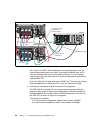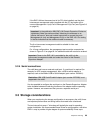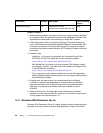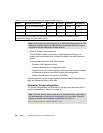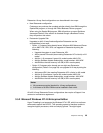90 IBM ^ xSeries 440 Planning and Installation Guide
The following redbooks discuss IBM tape solutions in greater detail:
Netfinity Tape Solutions
, SG24-5218
The IBM LTO Ultrium Tape Libraries Guide
, SG24-5946
3.4 Server partitioning and consolidation
The concepts of server partitioning and consolidation are discussed in detail in
Chapter 2, “Positioning” on page 35.
Implementing a server consolidation solution using VMware and the x440
introduces a number of important and unique issues that you need to consider
during the planning phase of your project.
In particular the x440 configuration needs to be carefully sized to meet the
resource requirements of the VMware operating system, the guest operating
systems, and the applications being deployed.
A detailed discussion on planning, sizing, and implementing VMware solutions
on the x440 can be found in the redbook
Server Consolidation with the IBM
^
xSeries 440 and VMware ESX Server
, SG24-6852.
3.5 Operating system considerations
In line with the overall message of providing application flexibility to meet the
varying needs of our enterprise customers, the x440 is optimized for numerous
operating system and application solutions. For the latest operating system
support information, go to:
http://www.pc.ibm.com/us/compat/nos/matrix.shtml
As described in 1.4.1, “Intel Xeon Processor MP” on page 13 Hyper-Threading
technology allows a single physical processor to appear to the operating system
and applications as two logical processors. The logical processors share the core
processing engine of the physical processor but are able to execute code
streams concurrently.
Operating systems must be “Hyper-Threading aware” before they can “see” the
additional processors. When they are, they will “see” twice as many CPUs are
there really are (see Figure 4-8 on page 118 for an example).
Simply enabling Hyper-Threading may not guarantee improved overall system
performance, however. In order to benefit from enabling Hyper-Threading, the
operating system and server applications need to be capable of detecting the



